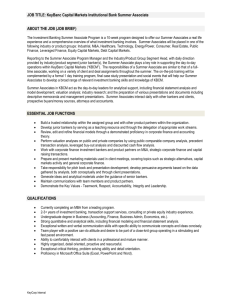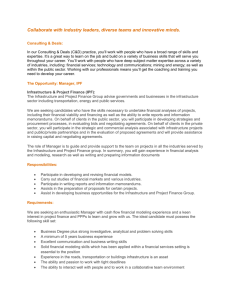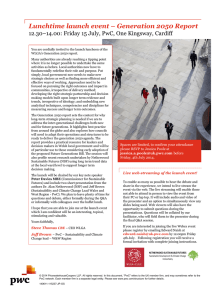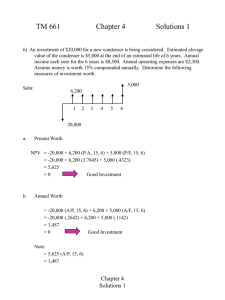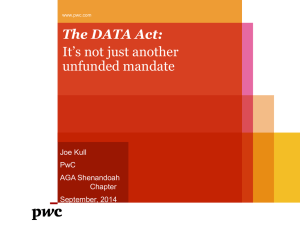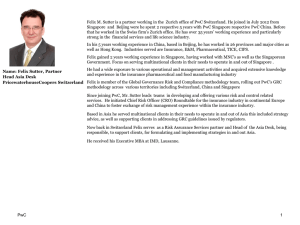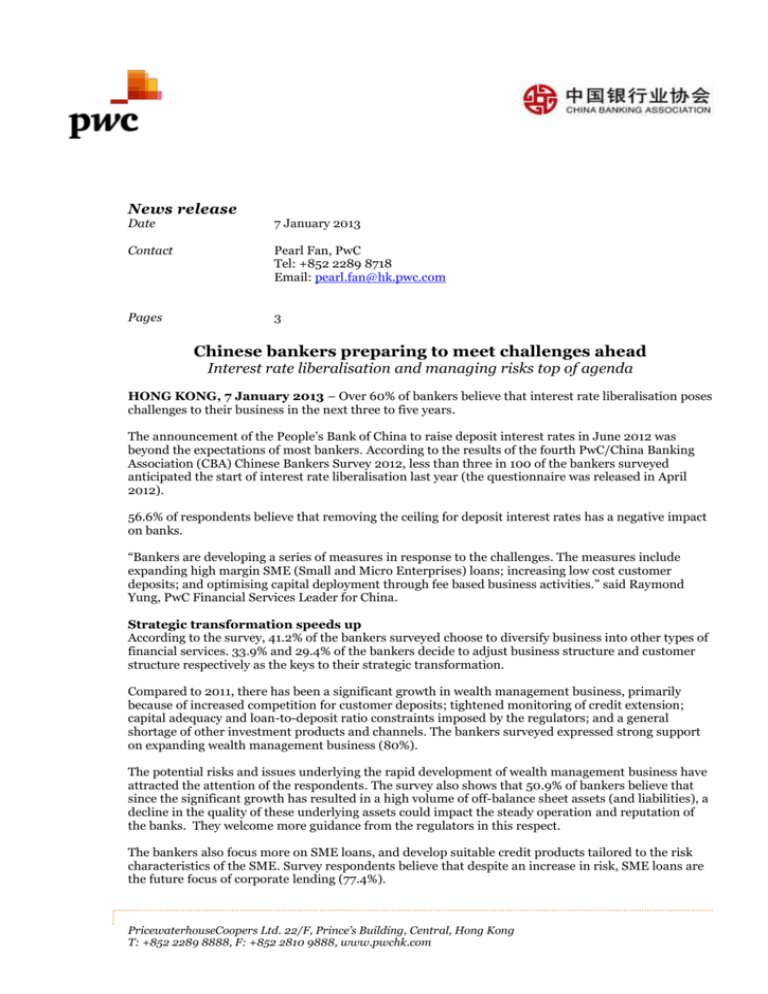
News release
Date
7 January 2013
Contact
Pearl Fan, PwC
Tel: +852 2289 8718
Email: pearl.fan@hk.pwc.com
Pages
3
Chinese bankers preparing to meet challenges ahead
Interest rate liberalisation and managing risks top of agenda
HONG KONG, 7 January 2013 – Over 60% of bankers believe that interest rate liberalisation poses
challenges to their business in the next three to five years.
The announcement of the People’s Bank of China to raise deposit interest rates in June 2012 was
beyond the expectations of most bankers. According to the results of the fourth PwC/China Banking
Association (CBA) Chinese Bankers Survey 2012, less than three in 100 of the bankers surveyed
anticipated the start of interest rate liberalisation last year (the questionnaire was released in April
2012).
56.6% of respondents believe that removing the ceiling for deposit interest rates has a negative impact
on banks.
“Bankers are developing a series of measures in response to the challenges. The measures include
expanding high margin SME (Small and Micro Enterprises) loans; increasing low cost customer
deposits; and optimising capital deployment through fee based business activities.” said Raymond
Yung, PwC Financial Services Leader for China.
Strategic transformation speeds up
According to the survey, 41.2% of the bankers surveyed choose to diversify business into other types of
financial services. 33.9% and 29.4% of the bankers decide to adjust business structure and customer
structure respectively as the keys to their strategic transformation.
Compared to 2011, there has been a significant growth in wealth management business, primarily
because of increased competition for customer deposits; tightened monitoring of credit extension;
capital adequacy and loan-to-deposit ratio constraints imposed by the regulators; and a general
shortage of other investment products and channels. The bankers surveyed expressed strong support
on expanding wealth management business (80%).
The potential risks and issues underlying the rapid development of wealth management business have
attracted the attention of the respondents. The survey also shows that 50.9% of bankers believe that
since the significant growth has resulted in a high volume of off-balance sheet assets (and liabilities), a
decline in the quality of these underlying assets could impact the steady operation and reputation of
the banks. They welcome more guidance from the regulators in this respect.
The bankers also focus more on SME loans, and develop suitable credit products tailored to the risk
characteristics of the SME. Survey respondents believe that despite an increase in risk, SME loans are
the future focus of corporate lending (77.4%).
PricewaterhouseCoopers Ltd. 22/F, Prince’s Building, Central, Hong Kong
T: +852 2289 8888, F: +852 2810 9888, www.pwchk.com
“The Chinese banking industry is vigorously developing the SME business despite concerns on the
potential higher rate of non-performing loans in that sector,” added Mr Yung.
Servicing the real economy
“With China promoting industrial and economic restructuring simultaneously, the Chinese bankers
think that the best measure is to increase support on strategic emerging industries, technology
innovation industries, modern services industries, and culture businesses; and to reduce loans to
industries with restricted growth,” said Jimmy Leung, China Banking and Capital Markets Leader,
PwC.
According to the survey, strategic emerging industries (72%), logistics industry (52.1%), media and
culture industry (50.8%), machinery production industry (46.2%), agriculture, forestry, livestock
breeding and fishing industry (44.7%), and information technology services (44.2%) are the key
focuses of credit facilities in the future.
As in the past year, Chinese bankers continued to take a more cautious stance in loans for real estate
projects (67.4%) due to China’s current tightened policies on the property market.
Compared to 2011, Chinese bankers were less favourable in lending to the road and rail transportation
industry. More than 60% of the bankers surveyed say that the volume of local government financing
platform loans should be reduced, 58.8% express risk concerns and 26.6% believe that local
government financing platforms will be among the highest instances for loan default rates in the
following three years.
Lower economic growth expectations
Whilst bankers have lowered their expectations on China’s economic growth for 2012, around 50% of
the bankers surveyed say that the country’s economic growth for 2012 would be 7.5%, and they are
confident about the outlook on China’s medium and long-term economic growth prospects. 72.2% of
the bankers believe that technological innovation is the main source for China’s economic growth in
the next three to five years, and 59.6% indicate that benefits from policy transformation aid this
growth prospect.
Faced with a down turning economy, the bankers are most concerned about macro-control policy
change (75.1%), financial regulatory policy change (72.4%) and a global economic slowdown (64.4%).
About 25% of the bankers anticipate that the annual growth rate in income and profit will be higher
than 20%, and about half of the bankers believe that the non performing loan ratio will be below 1%
for the next three years.
“Despite the significant pressure on the Chinese banking environment caused by the global economic
downturn, Chinese bankers remain very positive about the industry’s future development,” added Mr
Leung.
Subscribe to our RSS feeds for updates on our press releases http://www.pwchk.com/home/eng/rss.html
# # #
Note to editors:
1. About the report
This survey is the joint effort of China Banking Association and PwC China. The project leader
is Dr Ba Shusong, Deputy Director, Financial Research Institute, Development Research
Center of the State Council of China. The survey respondents are senior management located
2 of 3
at the headquarters and branches of domestic banks in China. The total number of effective
questionnaires received is 850. In addition, the survey team also conducted an in-depth
interview with 25 senior executives including Directors and Vice Presidents and department
heads.
2.
About China Banking Association
Founded in May 2000, China Banking Association (CBA) is registered at the Ministry of Civil
Affairs as a national non-profit organisation. On behalf of its 168 members, it brings together
various categories of banking institutions to best represent the interests of this rapidly
changing industry. Centering its functions on "self-discipline, rights-protection, coordination
and service", CBA strives to safeguard the legal interests of the banking sector, maintain
market order, improve the overall competence of banking employees, provide high-quality
services to its members, and promote the healthy development of the banking sector.
3.
About PwC – Globally
PwC helps organisations and individuals create the value they’re looking for. We’re a network
of firms in 158 countries with more than 180,000 people who are committed to delivering
quality in assurance, tax and advisory services. Tell us what matters to you and find out more
by visiting us at www.pwc.com.
PwC refers to the PwC network and/or one or more of its member firms, each of which is a
separate legal entity. Please see www.pwc.com/structure for further details.
4.
About PwC - Mainland China, Hong Kong and Macau
PwC in Mainland China, Hong Kong and Macau work together on a collaborative basis,
subject to local applicable laws. Collectively, we have around 490 partners and a strength of
around 13,500 people.
Providing organisations with the advice they need, wherever they may be located, our highly
qualified, experienced professionals listen to different points of view to help organisations
solve their business issues and identify and maximise the opportunities they seek. Our
industry specialisation allows us to help co-create solutions with our clients for their sector of
interest.
We are located in these cities: Beijing, Shanghai, Tianjin, Chongqing, Dalian, Xi'an, Qingdao,
Nanjing, Suzhou, Hangzhou, Ningbo, Xiamen, Guangzhou, Shenzhen, Hong Kong and Macau.
2013 PricewaterhouseCoopers. All rights reserved.
3 of 3

